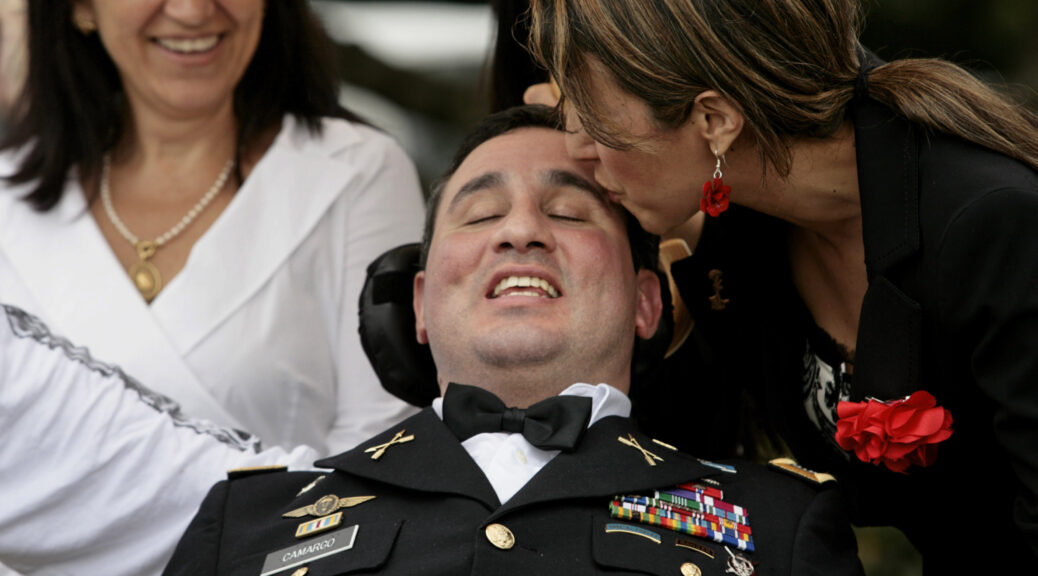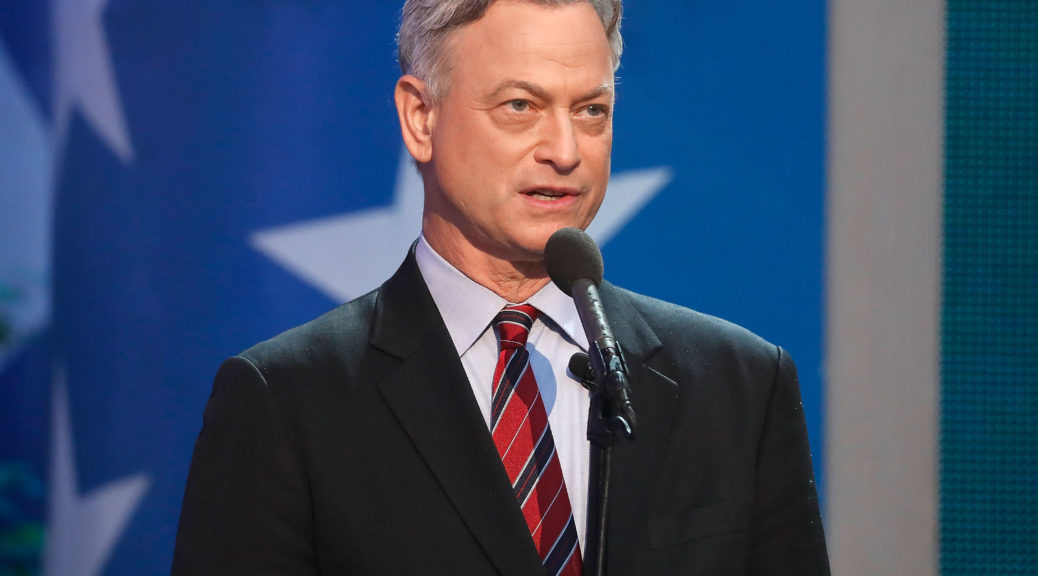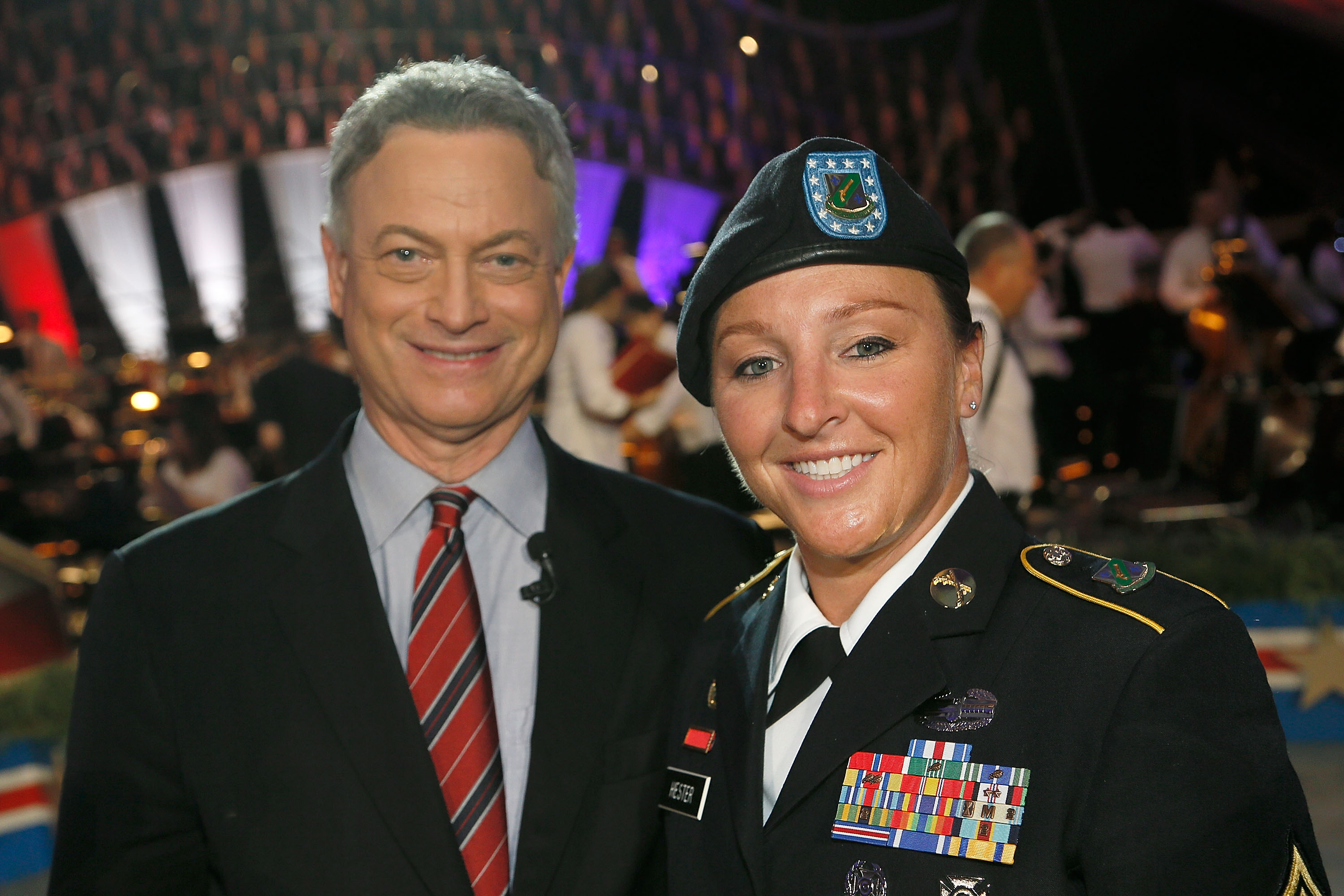Romulo Camargo proves a paralyzing bullet can’t stop him from living life and giving back to others.
By: Heather Newgen
Romulo “Romy” Camargo always knew he’d serve his country and at 19 he joined the military where he spent most of his time in the Special Operations community with the 75th Ranger Regiment and 7th Special Forces Group. On his third deployment in Afghanistan, the Chief Warrant Officer volunteered to help deliver humanitarian aid to a local village after his mission was canceled. A mishap took place when the bucket loader they were using to repair roads flipped. ‘We had to destroy the bucket loader so it would be inoperable so the insurgents wouldn’t take the parts from it. Once we destroyed the bucket loader we were returning to base and that’s when we were ambushed,” Camargo told The Voluntourist.
The Green Beret was hit in the back of his neck. “Chief is down. Chief is down,” is all I remember hearing from that moment,” Camargo said. His medic rushed to him and performed an emergency tracheotomy in the middle of crossfire, while the other soldiers fought back against the insurgents. His team stabilized Camargo and he was medevaced to Germany, but nobody expected him to live.
12 years later, the highly decorated officer is not only alive, but giving back to wounded veterans. Camargo is paralyzed from the shoulders down, but that isn’t stopping him from living life and serving others.
He believes he’s been given a second chance at life and takes the opportunity to share his blessing with others. He started the non-profit Stay in Step, which is dedicated to helping people with spinal cord injuries. The facility is uniquely designed to focus on mental and physical well-being and to accommodate patients families.
His wife Gaby, whom he met in Venezuela when they were 12-years-old, has been by his side through it all, and the two have relied on their faith to cope with the sacrifices and life changes, which have helped make their family that much stronger.
Camargo’s story will be featured on the National Memorial Day Concert this Sunday on PBS, and The Voluntourist had the chance to talk with the couple.
 Romulo and Gaby Camargo
Romulo and Gaby Camargo
Photo by Romy Camargo
The Voluntourist: You were first honored at the National Memorial Day Concert in 2015. What was that experience like for you?
Romulo Camargo: I couldn’t believe it. It was very humbling and it was an honor for us to be honored there in 2015. My medic was there, who did the emergency tracheotomy and my other teammate who rolled me over and called the medics was also there as well.
The Voluntourist: It must have been such a nice surprise to hear PBS is telling your story again this year.
Romulo Camargo: Yeah. So they’ll be retelling my story again. And when they told me it was an honor again. It was a blessing to be able to be honored in a concert, as big as the PBS National Memorial Day Concert is. I’m just glad to have my story out there and to be able to show the world what we can do, when to take adversity and change it into a good thing.
RELATED: Gary Sinise on taking a break from Hollywood and advocating for American troops
The Voluntourist: Is that what you want people to take away from your story?
The Voluntourist: Yes, ma’am. It’s how you take that adversity and change it into a good story of hope and strength and honoring commitment.
The Voluntourist: I understand you wanted to join the military after watching your brothers graduate from Airborne School. What was so significant about that event for you?
Romulo Camargo: I always looked up to my brothers. I thought it would be a perfect moment, that I decided to join the military as well, probably in their footsteps or whatnot.
The Voluntourist: How old were you when you joined?
Romulo Camargo: I was 19.
The Voluntourist: And you did three separate tours in Afghanistan?
Romulo Camargo: Yes, I was traveling extensively through Central and South America at first and then we went to Afghanistan in 2005, 2007, and 2008
The Voluntourist: 2008 is when the incident took place, correct?
Romulo Camargo: Yes, ma’am, we’re ambushed on September 16, 2008. I received a gunshot wound to the back of the head.
The Voluntourist: How old were you at that time?
Romulo Camargo: 33.
The Voluntourist: Can you take me back to the day of the ambush and explain what happened, to the best of your knowledge?
Romulo Camargo: So, we were conducting humanitarian mission down in Zabul province, Afghanistan and while we were conducting the mission, we were ambushed and while I was directing fires, I received the gunshot wound to the back of the head, right behind the ear and it hit my C3 vertebrae and I was paralyzed from the shoulders down, and then my medic came and did an emergency tracheotomy and got me breathing again. My team members came, packaged me up, put me on a medevac bird. [I went] from the battlefield to Kandahar, Kandahar to Bagram, Bagram to Germany, Germany to Walter Reed. All in three days.
The Voluntourist: And Gaby, take me back to the day that you were told about what happened.
Gaby Camargo: I received a phone call on September 16th, around 11:30 a.m. I wasn’t at home at that time and it was one of his teammates. He wasn’t deployed with Romulo. He was in Fort Bragg. So basically he was the one in charge. He was the one that Romulo told if something happened to me, you will be in charge with telling Gaby everything. So I received a phone call around 11:30 a.m, it was him and he was asking me if I was at home. I told him, “No, I’m not at home because I was buying some supplies for my birthday.” My birthday is on September 19th and that was September 16th. So as soon as I received the phone call, I had this weird feeling that I had at that moment. So I told him, “Is everything okay?” And he told me, “Yes, everything’s okay. I have a package for you from Romulo. So, I need to see you.” And I told him, “I’ll be back in 20 minutes.” And that’s how I did it. So when I got home, I would say 10 minutes later, someone was knocking on the door. And when I went to open the door, it was him and two other military people wearing the uniform, and of course, I was in shock. So after a few minutes, that I was crying and all of that, they told me what happened to Romulo. They told me he was running his team, they were ambushed and he was shot in the back of his head. And I was asking them, “How is he doing? Is he alive?” And they told me that they didn’t know. The only thing that they told me is they’re doing their best and we will keep you posted with everything. So they stayed with me, I would say, 30 minutes and then they left. After they left, 25 minutes later, I received another phone call and they told me, “He’s stable. We don’t know his condition, but at least he’s stable. And they are transferring him from a local hospital to a bigger hospital in Afghanistan.” And that was on September 16th. And then of course, like he just said, he arrived here in the States three days later, on my birthday, September 19th. So, he was my best gift.
The Voluntourist: Gaby, I understand that you felt like this situation was part of a bigger plan and that you could turn this around to help others. Romy did you feel the same?
Romulo Camargo: Well, once I was stable, I started talking to all the other wounded warriors, helping them out, and just taking them through what I went through and sitting down with them and talking about how the recovery process would be and give them some motivation, being there for them. Being an advocate for all the other wounded warriors that I came in contact with.
The Voluntourist: Is that how you came about starting your organization?
Romulo Camargo: Well, Gaby and I started talking about that because the system didn’t have anything in place in Tampa that provided long term free implementation that we provide. So Gaby and I went off in that venture with a couple of mentors. We created Stay In Steps brain and spinal cord injury recovery.
Gaby Camargo: Heather, let me compliment what Romulo just told you. Number one, he has been more than 18 months as an inpatient at the VA hospital here in Tampa. When we were there, it’s not that I want to talk about us, but we were very, very proactive. Always looking for new procedures, always looking for new resources available for him, and of course, family members. So that was Romy and I for 18 months. So after Romulo was discharged, of course my husband, he worked in the special operations community his whole life. So my husband, he wanted to do more in the system. Unfortunately, they weren’t prepared for that. We were looking for more options and in 2011, we’d be teaching in a STEM cells procedure. Romulo became the first active duty in the nation receiving a STEM cell transplant. When we come back from Europe because the procedure was done in Europe, in Lisbon, Portugal, when we came back, we were looking for an aggressive rehabilitation. So back then, he was doing rehab at the VA Tampa, but we needed something more. And that’s why we decided to look for new options, new rehab centers around the Tampa Bay area, we didn’t find any. And we found one in Orlando. So we decided, let’s go to Orlando twice a week so you can conduct therapy in Orlando and at the same time, you will be doing therapy here at the VA. So basically he was doing therapy five days a week, intense in Orlando two days and three days here in Tampa. But we did it for two and a half years, but I would say after the first six months I told Romulo, we have to be realistic. This is a lifetime for you, we need to do something here in Tampa. There’s a gap in the health care system in Tampa, let’s do something about it. Tampa, we have one of the biggest base in the country, which is Macdill, we’re still fighting a war, Afghanistan, Iran, more wounded warriors are coming back home and the system is not prepared for them. So we decided to do something about it and it took us a year and a half to raise the funds and open the center. Our motivation, basically was to see that the health care system wasn’t offering them everything that they needed. My husband is a warrior and he will be a soldier forever. So basically the system, it was limiting him, what options can I do, you know? So that’s why we decided to do something about it.
The Voluntourist: Can you both talk about how your faith has played a part in this situation?
Gaby Camargo: Heather, that’s everything. Let’s put it like that. If I go back to the first day they told me this is what happened to Romulo. Well, you can imagine, when they told me that I was crying, but after a few minutes I told them, “Look, I believe in the Lord and you will see my husband will be my best gift.” And he was. So faith, for Romy and I, is everything. That’s our motivation to get up every morning knowing that something good is going to happen. That every time that we have our moments, that we feel down, that we have been seeing the same thing, the same picture for 11 years. But then you get up the next morning, you remember the scripture and everything that we have been learning through the years and that’s our motivation to keep moving forward. I’m a lawyer in my country. I’m an attorney in Venezuela. Romulo is the military, but the reality is that your background, career doesn’t matter. When you live something like this, in reality like this one. Every day, that doesn’t matter. It’s all about faith and hope. That’s your gas. There’s no way that you can overcome any adversity in life if you don’t have God. That’s the way that I see it.
Romulo Camargo: I would say I wasn’t really a believer until I got shot that day. The Lord Jesus Christ brought me down to my knees. I started believing more and with Gaby we’ve put that in our lifestyle ever since I got shot. For me, it has has given me the strength to be able to have handled it for the last 12 years and being able to share with some of our clients that go to Stay in Step. So for me it’s really helpful.
The Voluntourist: Romy, what’s been the hardest part of all of this for you?
Romulo Camargo: The hardest part is just trying to see, just being there, trying to see movement and just keeping on, keep going hundred percent towards my rehab. Being able to be here for my family, my children. Just being here and trying to keep doing physical therapy three to four times a week and just keep going, keep going that constant.
The Voluntourist: A lot of people would have given up. To be told that you’re going to be paralyzed for the rest of your life and things are going to be a lot different from now on. A lot of people would have given up, but what makes you keep going?
Romulo Camargo: You make it a lifestyle. And being a C3, which is one of the highest level of cervical injury that we’ll be able to be out and about without a ventilator and whatnot. I just have to keep going and keep pushing myself just to stay healthy and to keep the lifestyle that I’ve been living for the last 12 years. I’ve got to be here for my family, I have to be a husband, a father, a brother, a teammate. So, that’s what keeps me going. And the Lord Jesus Christ keeps giving me that strength to keep going and doing what I’ve been doing for the last 12 years.
To see more of Camargo’s story, watch the 2020 National Memorial Day Concert Sunday, May 24 at 8/7c on PBS.



 WASHINGTON, DC – MAY 27: Co-host Gary Sinise and Silver Star recipient Leigh Ann Hester pose for photo during the finale of the 2018 National Memorial Day Concert at U.S. Capitol, West Lawn on May 27, 2018 in Washington, DC. (Photo by Paul Morigi/Getty Images for Capital Concerts)
WASHINGTON, DC – MAY 27: Co-host Gary Sinise and Silver Star recipient Leigh Ann Hester pose for photo during the finale of the 2018 National Memorial Day Concert at U.S. Capitol, West Lawn on May 27, 2018 in Washington, DC. (Photo by Paul Morigi/Getty Images for Capital Concerts) WASHINGTON, DC – MAY 29: Actors and co-hosts Gary Sinise and Joe Mantegna onstage at the 27th National Memorial Day Concert on May 29, 2016 in Washington, DC. (Photo by Paul Morigi/Getty Images for Capitol Concerts)
WASHINGTON, DC – MAY 29: Actors and co-hosts Gary Sinise and Joe Mantegna onstage at the 27th National Memorial Day Concert on May 29, 2016 in Washington, DC. (Photo by Paul Morigi/Getty Images for Capitol Concerts)